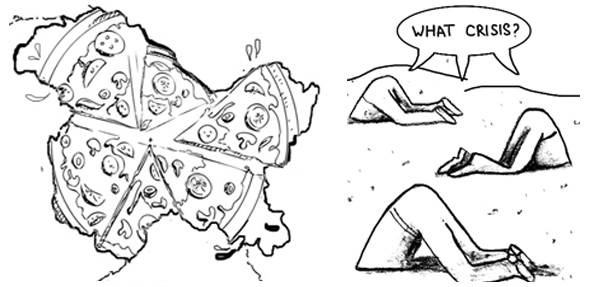
Combating crisis
Sir,
We are living in a time of immense crisis. Militancy and extremism have affected us all profoundly. In this situation, we feel it is vital that the media play a role in reshaping opinion and determining people’s behaviour towards each other.
The owners, operators and publishers of all TV channels, radio stations, newspapers, magazines and other media outlets need to run a campaign for one year to combat extremism. To achieve this, all TV channels must assign at least one hour of daily programming to material intended to combat extremist thoughts. Similarly, radio channels must assign 30 minutes to this cause, newspapers should devote a quarter page of ad space daily to anti extremist thought and the print and online media must also give editorial space to articles for this purpose.
We believe these actions could play a crucial role in helping to rebuild a nation that has been ravaged by bombs, bigotry and intolerance. A responsible media that unequivocally acts in the interest of people is our greatest need. Media outlets who engage in this will gain the much needed trust and goodwill of the people. We need the media to act today.
Amena S,
Islamabad.
Business of politics
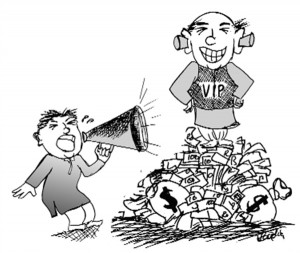
Sir,
The politics of Mohammad Ali Jinnah and Allama Muhammad Iqbal were driven by ideologies. Their motive was to serve the people. But after their demise, evacuee property was plundered through fake claims, and the bureaucracy declined to accept the change that in a sovereign independent country, state resources, land and assets should be dedicated for welfare of the most deprived, not to be doled out to buy loyalties of natives, as was the practice during the British Raj.
Then came Ayub Khan, imposing a martial law, burying Jinnah’s concept of a democratic welfare state with such schemes as bonus vouchers, enticing politicians without principles to build business empires in return for pledging loyalty to him. Those were the days when state funds started officially being plundered.
Individuals grew from rags to riches, tax evasion and corruption became institutionalized, and those entrusted with making policies betrayed their motherland, seeking foreign nationalities, while Pakistan became a transit place to make quick bucks and conveniently transfer them to foreign safe havens.
Corruption is accepted as a perk of power. When the US imposed an embargo on the sale of F16s to Pakistan, Islamabad had paid $500 million of the total $650 million, but we were told that balance due was $150 million plus $30 million for administrative expenditure – a name for commissions paid to those who matter and cannot be held accountable. Conveniently, there was no penalty in the one sided agreement for delays.
While Pakistan’s foreign reserves depleted and state owned enterprises like PIA, Railways, and Pakistan Steel Mills were driven to bankruptcy, individual and institutional corporate interests multiplied but debts mounted. The country’s security was in tatters, with terrorism threatening the state from within, and elite housing societies replacing green belts around every major city.
Tariq Ali,
Lahore.
Have faith
Sir,
The attribute of insecurity in an individual’s personality is a combination of lack of trust and confidence in his or her own being. This attribute is found in all age groups, ranging from childhood to adolescence and beyond. Many times, this sense of insecurity grows larger when a person ages as fears of losing the loved ones, possessions and other acquisitions creeps in. At other times, a person becomes more mature as he or she ages; and becomes capable of coping with insecurities effectively.
The feeling of insecurity exists at the domestic, personal and professional level. The feeling prevalent at the domestic and personal level involves instances of relationship management, which inculcates fears, thwarts confidence and trust regarding different relationships. It eventually spoils the relationship dynamics.
At the professional level, the feeling of insecurity prevails amongst the subordinates, fellow colleagues and peers. They fear the loss of their jobs, recognition and esteem in the workplace. Such feelings of insecurity are largely attributed to communication barriers, low level of self-efficacy in a person, and over indulgence in rivalries and competition. The feelings of insecurity distort one’s personality, and impede the effective utilization of one’s interpersonal skills.
Considering the adverse implications of insecurity residing in one’s personality, there stands a need to overcome this attribute. This can be well managed by holding a firm faith and by trying to raise self confidence and self trust. Not holding undue expectations from different relationships, and learning to manage relationships in a balanced way, aid in overcoming the sense of insecurity amongst individuals.
In addition, overcoming communication gaps amongst individuals, engaging in positive and healthy competition, and not imitating practices and values crazily are other positive initiatives for managing insecurity.
Aiyza Javaid,
Lahore.
Objection overruled
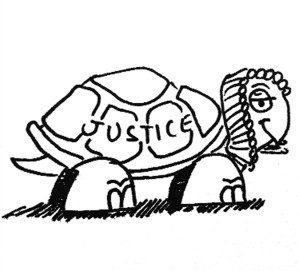
Sir,
According to a news report on January 10, Pakistan Bar Council and Supreme Court Bar Association are seriously considering challenging the formation of military courts in the Supreme Court.
May I appeal to the worthy lawyers to kindly practically prove that civil courts can also provide cheap and speedy justice with courage, and military courts are not required for the trial of terrorists?
M Akram Niazi,
Rawalpindi.
Kashmir conundrum
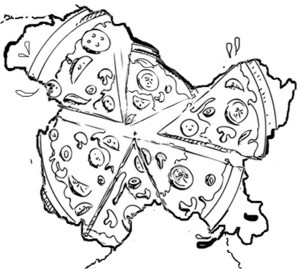
Sir,
I recently read a Bengali translation of an article by renowned Indian journalist, writer and diplomat Kuldip Nayar on the Kashmir problem, in Bangladesh Pratidin.
Mr Kuldip Nayar has said Jawaharlal Nehru was interested in resolving the Kashmir issue, but I beg to differ with him. Mr Nehru convinced the last British viceroy Lord Mountbatten to put the Gurdaspur district of Punjab in India. At that time, 80% of the population of Gurdaspur was Muslim. Gurdaspur had the only road connection with the mountainous Kashmir from Indian main land. This indicates that Mr Nehru had a motive on the Kashmir matter before 14th August, 1947. India was partitioned based on the two nation theory, ie the Hindu majority portion of the subcontinent would constitute India and the Muslim majority portion would constitute Pakistan. Hyderabad was a large estate and its ruler was Muslim. It even applied for the membership of the United Nations. India attacked Hyderabad in September 1948, the day Muhammad Ali Jinnah, the governor general of Pakistan, died.
In Kashmir, 80% of the population was Muslim but the ruler was Hindu. Mr Jawaharlal Nehru vehemently opposed the involvement of the United Nation forces when Muslim League made such a proposal. Lord Mountbatten was supposed to be impartial and neutral, and being a viceroy even tried to persuade Jinnah to be the first prime minister of undivided India. His daughter Pamela Mountbatten wrote in her book India Remembered that Nehru wanted to visit the Kashmiri Maharaja along with Lord Mountbatten. Mountbatten avoided that. But his messages were passed along, and as a result Maharaja Hari Singh left the idea of an Independent Kashmir and signed the agreement to join India. After 14th August, Lord Mountbatten became the Governor General of India and his British Army general became the Chief of Armed Forces of both the countries, which helped the Indian Army stay in Kashmir.
Jinnah was hopeful to achieve a viable Pakistan, but because of the interference of Lord Mountbatten, and due to Congress and Jawaharlal Nehru, many vital parts of Pakistan were given to India.
East Timor was a part of Muslim Indonesia. A majority of its population is Christian. They wanted independence from Indonesia. The government of Indonesia held a plebiscite, and when a majority voted for an independent East Timor, Indonesia given them independence.
Scotland also wanted independence. The British government recently held a plebiscite in Scotland, and a majority voted in favor of remaining within the United Kingdom.
Malaysia is a Muslim country and Singapore was a part of Malaysia. But Singaporeans are mostly Chinese. They wanted to be an independent country. Malaysia did not oppose that, and gave them independence. Singapore and Malaysia are now prosperous nations and are maintaining the best of relations.
Why India is refusing to hold a plebiscite in Kashmir then?
Syed Moazzem Hussain,
Dhaka.
Good luck
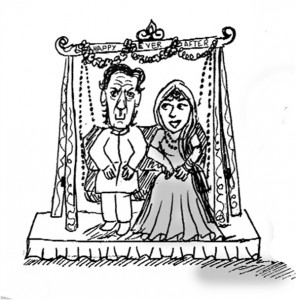
Sir,
Just prior to the US presidential elections of 1960, Jacqueline Lee Bouvier went to interview John F Kennedy and subsequently got married to him. History repeats itself. Reeham Khan met Imran Khan for an interview the first time in January 2013.
Whether one agrees with his politics or not, Imran has, in his own way, contributed towards social causes in the country. His first marriage unfortunately could not work out but he decided to live in Pakistan to follow his goal to bring a change for the better in the country. Neither he nor his ex-wife ever spoke negative against each other. Jemima Khan has shown a nice gesture in inviting the newly wed couple to England for their honeymoon. Let us hope and pray fo the success of Imran Khan’s new marriage.
Anwar Khalil Sheikh,
Lahore.
‘You are free’
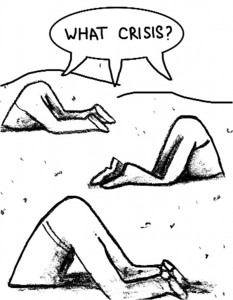
Sir,
The only consequential part of Chaudhry Nisar’s soporific pretense that the constitution means anything to anyone was the oxymoron that our ‘brotherly Muslim states’ were funding terrorism and militancy.
Military courts were an ordained reality, invoked or conceded grudgingly or with muted criticism, even by parties most concerned at being mauled by the “tomcat.” Having done little of consequence over the years allotted to it, the parliament pretended it ‘did not buckle down’ to ratify the 21st Amendment. The farce is true justification of the ‘revenge of democracy’ by an establishment and multiple governments that long ago threw Mr Jinnah’s ideals out the window. Given our history, apart from the obvious fear of heralding another ‘decade of development’ (or enlightened variation thereof) is it likely these courts will achieve the hopefully desired objective, before they are, equally hopefully, disbanded? Will all condemned terrorists, bigots, and major criminals (not falling into either of the two broad categories) be hanged forthwith and will any and all persons remotely associated with such activities be summarily tried and suitably condemned? Will Mr Jinnah’s “You are free…” come true? Or, as our ‘democrats’ suddenly have realized, are we likely to have more overt manipulation and tighter control while selectively sparing ‘our assets’?
Our problem is that, ostrich like, we avoid reality. Terrorism related to militancy and bigotry has escalated despite years of control of our cities by paramilitary forces. Thousands of people have died and nothing was done. So wide is our national polarization and so deeply ingrained is bigotry and hypocrisy that we remain unable to acknowledge this as our war and the enemy as within. This delusional infection permeates all levels of power and is funnelled into the poor, illiterate and religio-feudal controlled citizenry. Even now the debate is on saving face: ignoring the reasons for the failure of our existing law enforcing, judicial and penal system; not in attempting to correct the faults. The ‘Doctrine of Necessity’ that many years ago emasculated Rule of Constitutional Law has left a lasting legacy of incompetence, nepotism and self-service. Deliberate manipulation of religious and secular politics to further various ‘agendas’ contributed to the recent massacre. Sadly, as the continuing saga of Lal Masjid and the brazen attack on Salman Taseer’s remembrance vigil show, the end is nowhere in sight.
Military’s “fast track” courts are doomed unless what’s left of the civic society rises to defend Mr Jinnah’s Pakistan that, from the very beginning, the feudal-mullah axis has been inimical to. A start has been made at both the above venues showing that a few good people can initiate the domino effect for change for better. It will not be easy but the need of the hour is for all, including those progressives seeking ‘democratic regime change,’ to join forces for the far more important issue of national survival.
The military must be reminded of its constitution role. Simultaneously and equally, politicians must be forced to implement critical judicial and penal reforms with adequate checks and balances on all. Good governance and rule of law stems from here. Electoral reforms and other “democratic” benefits will come when people make this country something worth living and fighting for.”
Dr Mervyn Hosein,
Karachi.

